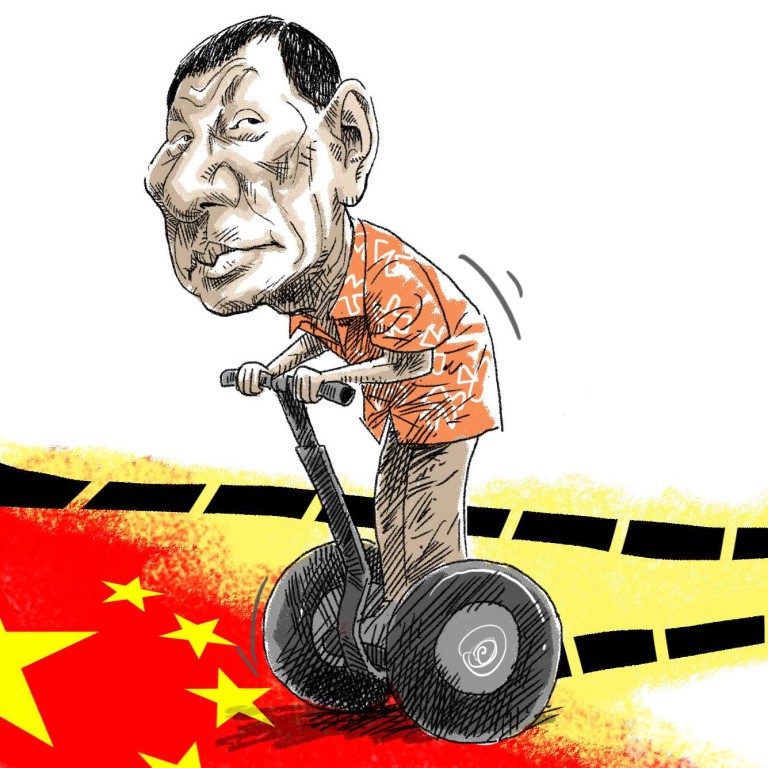
Duterte’s ‘pivot’ to China offers a reminder that all Asian diplomacy should be guided by subtlety and care
Tom Plate considers the changing geopolitical order in the region – brought home by Manila and Beijing becoming fast friends – as China’s ascendency continues

We should not be surprised. The central global political fact of our times is the gravitational pull of growing China, all but destined to become the Asian superpower. It will not be easily resisted. Wake up, Americans. It’s the 21st century, not the 20th.
Master class: how China has stolen US thunder on world stage
And so now you have the Philippines. With the finesse of a dump truck, one day Duterte decides to drop Uncle Sam in order to embrace the inheritors of Mao’s China – now profiting from a quasi-market system that more and more seems to resemble that of the political one-party Taiwan of the 1990s. Visiting China, Duterte declaims for all the world to hear: “America has lost now”. “I’ve realigned myself in your ideological flow,” he told his Chinese hosts.
The mainland’s success with state-guided marketisation provides the goodies for the likes of Duterte’s Philippines. From his perspective, China can offer his country more than the US. Let’s face it: Uncle Sam no longer has the wherewithal to be Santa Claus to everyone, all the time – as in the grand old days of goodies for all.
Is there risk for Duterte? The obvious would be that were China to invade the Philippines tomorrow, Washington might look the other way – but China doesn’t need to invade anyone. Its inherent size and growing presence will ineluctably pull its neighbours closer to it, one degree of reduced separation after another. Osmosis rather than offensiveness will suffice.
America is otherwise engaged. From the Obamas on down, the White House is in what we term “Outbox” mentality. They are focused in on the margin of Hillary Clinton’s victory, not on the magnitude of Manila’s perfidy. Duterte’s timing might be thought sly: the White House at this moment is distracted and on the campaign trail – and even thinking about how soon it will be packing its bags.
To be sure, the permanent national security government entity that includes the defence and state departments, not to mention the CIA and the overall national security apparatus, are watching, however. This is the permanent locus of America’s geopolitical wariness and obsessions; and it is one US elephant that usually doesn’t forget. As long as countries in Asia, such as Laos, Cambodia and now, perhaps, the Philippines play proactive binary geopolitics – that is, either Beijing or Washington, one or the other; the new Asian dating game – the now ongoing regional reorientation – will prove bumpy and sometimes brutal.

How the US got outplayed in the Asia-Pacific
My only advice to the nations rotating around the land of the rising Chinese sun is to avoid lurching and aim for suavity in diplomacy. Under the Philippines’ prior president, the well-intentioned but ineffective Benigno Aquino, Manila’s foreign policy tilted dramatically towards the US; but then the successor government in Manila starts leaning like a drunken sailor in the other direction. Neither extreme can be said to be in the country’s national interest.
The Asian planets revolving around the China sun are best advised to organise their diplomatic reorientation with more subtlety and care.
Wake up, Americans. It’s the 21st century, not the 20th
Beijing played off against Washington; Washington against Beijing. This new Asian diplomacy aims to “yin-yang” the two superpowers with insincere tenderness so as to milk each cow for whatever each one is worth. Something of this mentality may well have arrived in Vietnam and Malaysia and, perhaps before long, Indonesia. Asian nations will enjoy many opportunities to benefit from the dating game. Even now, Japan, the US surrogate in the region, is expected to proffer a new US$48 million loan package to the Philippines.
It may all end in sadness. The wooing of Duterte was no casual afterthought on Beijing’s part. Months ago, a Chinese government diplomat tipped me off about what was going on. Behind the scenes, Beijing was working hard on a deal with Manila well before the issuance of the Permanent Court of Arbitration at The Hague’s negative ruling on China’s entitlement claims in the South China Sea.

Duterte’s tilt towards China set to ‘test US pivot to Asia’
Any way you figure it, the Philippines pivot is a tactical triumph for Chinese diplomacy. But I wonder about its sustainability: the Filipino people probably have more fundamental affection for the Americans than the Chinese, whose sudden bonhomie may feel suspiciously – er – fishy. The US State Department, assuming the January inauguration of Clinton, can be expected to make another serious run at East Asia. As the presumed 45th president of the United States put it to a Wall Street audience a few years ago: “We liberated it. We defended it.”
As of now, however, the reconfiguration of the diplomatic orbits of the nations of Asia – with the Chinese sun rising ever higher – proceeds apace. Almost no one in America is psychologically prepared for this new reality. Maybe Aquino swung too far one way, Duterte the other. But now the Chinese pull feels more and more ineluctable.
For China and the US, bound by trade, great power brings great responsibility
The better approach to geopolitical order in Asia and peace in general would be for Beijing and Washington to work together, hand-in-glove, like adults. This is not happening.
This bodes ill: I doubt that Clinton will ignore what is happening, and Beijing won’t back down. So a measure of some sort of future conflict surely looms.
Columnist and Loyola Marymount professor Tom Plate is founder of Asia Media International and vice-president of the Pacific Century Institute in Los Angeles

